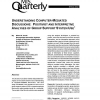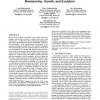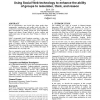3333 search results - page 159 / 667 » New Invariants for Groups |
MISQ
2000
13 years 10 months ago
2000
This research considers whether interpretive techniques can be used to enhance our understanding of computer-mediated discussions. The case study considered in this research is th...
JMLR
2011
13 years 5 months ago
2011
We propose a framework MIC (Multiple Inclusion Criterion) for learning sparse models based on the information theoretic Minimum Description Length (MDL) principle. MIC provides an...
KDD
2006
ACM
14 years 10 months ago
2006
ACM
The processes by which communities come together, attract new members, and develop over time is a central research issue in the social sciences -- political movements, professiona...
SIGMOD
2009
ACM
14 years 10 months ago
2009
ACM
We are experiencing a new Social Web, where people share, communicate, commiserate, and conflict with each other. As evidenced by systems like Wikipedia, twitter, and delicious.co...
IJSN
2008
13 years 10 months ago
2008
: Security has become the corner stone of research in wireless sensor networks (WSNs). Due to the unique operational environment of WSNs, where the communication medium is open to ...



